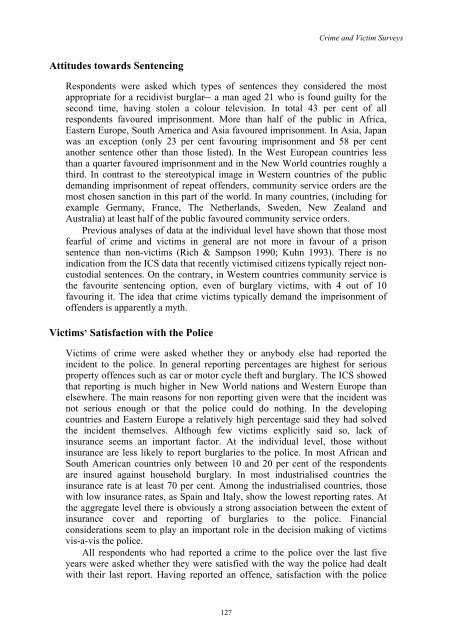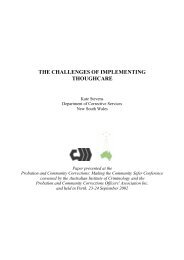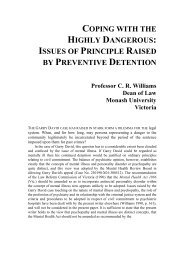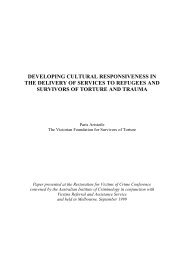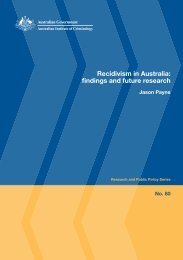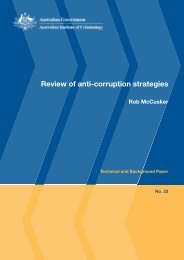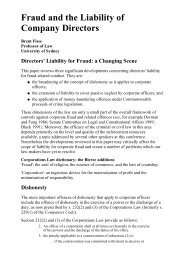Crime and victim surveys - Australian Institute of Criminology
Crime and victim surveys - Australian Institute of Criminology
Crime and victim surveys - Australian Institute of Criminology
Create successful ePaper yourself
Turn your PDF publications into a flip-book with our unique Google optimized e-Paper software.
<strong>Crime</strong> <strong>and</strong> Victim Surveys<br />
Attitudes towards Sentencing<br />
Respondents were asked which types <strong>of</strong> sentences they considered the most<br />
appropriate for a recidivist burglar⎯ a man aged 21 who is found guilty for the<br />
second time, having stolen a colour television. In total 43 per cent <strong>of</strong> all<br />
respondents favoured imprisonment. More than half <strong>of</strong> the public in Africa,<br />
Eastern Europe, South America <strong>and</strong> Asia favoured imprisonment. In Asia, Japan<br />
was an exception (only 23 per cent favouring imprisonment <strong>and</strong> 58 per cent<br />
another sentence other than those listed). In the West European countries less<br />
than a quarter favoured imprisonment <strong>and</strong> in the New World countries roughly a<br />
third. In contrast to the stereotypical image in Western countries <strong>of</strong> the public<br />
dem<strong>and</strong>ing imprisonment <strong>of</strong> repeat <strong>of</strong>fenders, community service orders are the<br />
most chosen sanction in this part <strong>of</strong> the world. In many countries, (including for<br />
example Germany, France, The Netherl<strong>and</strong>s, Sweden, New Zeal<strong>and</strong> <strong>and</strong><br />
Australia) at least half <strong>of</strong> the public favoured community service orders.<br />
Previous analyses <strong>of</strong> data at the individual level have shown that those most<br />
fearful <strong>of</strong> crime <strong>and</strong> <strong>victim</strong>s in general are not more in favour <strong>of</strong> a prison<br />
sentence than non-<strong>victim</strong>s (Rich & Sampson 1990; Kuhn 1993). There is no<br />
indication from the ICS data that recently <strong>victim</strong>ised citizens typically reject noncustodial<br />
sentences. On the contrary, in Western countries community service is<br />
the favourite sentencing option, even <strong>of</strong> burglary <strong>victim</strong>s, with 4 out <strong>of</strong> 10<br />
favouring it. The idea that crime <strong>victim</strong>s typically dem<strong>and</strong> the imprisonment <strong>of</strong><br />
<strong>of</strong>fenders is apparently a myth.<br />
Victims’ Satisfaction with the Police<br />
Victims <strong>of</strong> crime were asked whether they or anybody else had reported the<br />
incident to the police. In general reporting percentages are highest for serious<br />
property <strong>of</strong>fences such as car or motor cycle theft <strong>and</strong> burglary. The ICS showed<br />
that reporting is much higher in New World nations <strong>and</strong> Western Europe than<br />
elsewhere. The main reasons for non reporting given were that the incident was<br />
not serious enough or that the police could do nothing. In the developing<br />
countries <strong>and</strong> Eastern Europe a relatively high percentage said they had solved<br />
the incident themselves. Although few <strong>victim</strong>s explicitly said so, lack <strong>of</strong><br />
insurance seems an important factor. At the individual level, those without<br />
insurance are less likely to report burglaries to the police. In most African <strong>and</strong><br />
South American countries only between 10 <strong>and</strong> 20 per cent <strong>of</strong> the respondents<br />
are insured against household burglary. In most industrialised countries the<br />
insurance rate is at least 70 per cent. Among the industrialised countries, those<br />
with low insurance rates, as Spain <strong>and</strong> Italy, show the lowest reporting rates. At<br />
the aggregate level there is obviously a strong association between the extent <strong>of</strong><br />
insurance cover <strong>and</strong> reporting <strong>of</strong> burglaries to the police. Financial<br />
considerations seem to play an important role in the decision making <strong>of</strong> <strong>victim</strong>s<br />
vis-a-vis the police.<br />
All respondents who had reported a crime to the police over the last five<br />
years were asked whether they were satisfied with the way the police had dealt<br />
with their last report. Having reported an <strong>of</strong>fence, satisfaction with the police<br />
127


